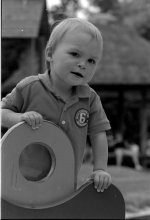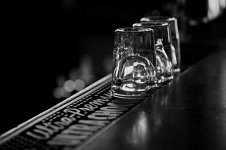Pepe
Established
Now I do not like this film. I can't get a decent contrast shot on it, I keep getting almost 50-50 Black OR White pictures.
But that isn't what the thread is about.
DUST.
My own developed film is dust free when I scan it. So is all colour C41 (if done at half-decent lab)
But every roll of BW400CN I have had done (five, I bought five to try the stuff out) comes back covered in dust. It's horrible.
Is this my bad luck or has the film itself something to do with this ?
All these things together, and the added insult of an orange base so I can't very well print myself, make me glad I shot the last roll.
Back to my APX.
But that isn't what the thread is about.
DUST.
My own developed film is dust free when I scan it. So is all colour C41 (if done at half-decent lab)
But every roll of BW400CN I have had done (five, I bought five to try the stuff out) comes back covered in dust. It's horrible.
Is this my bad luck or has the film itself something to do with this ?
All these things together, and the added insult of an orange base so I can't very well print myself, make me glad I shot the last roll.
Back to my APX.
alexz
Well-known
I started off with 400CN after leaping into BTW with RF - processed in my local lab just as regular C-41. Processing was good, clean (no dust/dirt issues) as usual C41 I get from them, however never managed to get a sharp, clearly looking image (or perhaps indeed a muddy, lacking contrast ...?), I I decided fro real B&W- there is no way around - but a real silver with own home processing. Now evolved into B&W manual geek - a great experience, well worth the learning curve..
kaiyen
local man of mystery
There is nothing about the film that makes it dusty  . Your lab is the problem.
. Your lab is the problem.
allan
allan
Pepe
Established
I thought so too at first so I tried three different labs my friend (with the added horror of having negatives cut by four, five and six).
And as I said, the colour ones came back normal. Perhaps it just looks that way. But I can't imagine thos white spots wouldn't show on colour.
Doesn't matter anymore. It's all gone
And as I said, the colour ones came back normal. Perhaps it just looks that way. But I can't imagine thos white spots wouldn't show on colour.
Doesn't matter anymore. It's all gone
vha
Isn't it coffee time ?
Been using this film for the last two years, and I also work in a lab, have not noticed any dust problems with the film compared to the other brands, neither any problems with sharpness .. did use XP-2 as BW film in 5 years before that, and did not have any problems there either. Changed over because the contrast was better and the film was more like 400 iso, XP-2 is more 200 than 400, but that was not the subject 
work on a fujifilm frontier, and it works just fine, have also tried to get the film scanned on a Agfa D-lab something and it kind of worked too.
On a general basis you might get some more dust on the film if the sharpness is set on normal on the frontier scanner, recomend the level bellow, you would also see that the jpg files are a bit to "hard"
vha
work on a fujifilm frontier, and it works just fine, have also tried to get the film scanned on a Agfa D-lab something and it kind of worked too.
On a general basis you might get some more dust on the film if the sharpness is set on normal on the frontier scanner, recomend the level bellow, you would also see that the jpg files are a bit to "hard"
vha
Last edited:
shadowfox
Darkroom printing lives
Strange that you're having dust problem, I used C-41 bw (expired Ilford XP2) for almost all of my photos and the dust, while present, are not excessive at all.
Can you upload a sample scan for us to look at?
Can you upload a sample scan for us to look at?
charjohncarter
Veteran
I couldn't take this film either. It was just plain muddy in my and my lab's hands.
Morca007
Matt
I bought a pack recently because it's the only B/W film available in town, and I needed some before I could get an order from amazon in.
Well, let's see how it turns out.
Well, let's see how it turns out.
peter_n
Veteran
I use XP2 (similar film) and ask for the roll to be left uncut. I then cut the roll and sleeve it at home. Result is dust-free negs.
Pepe
Established
.JL.
Established
I don't have any dust problem with BW400CN, but the results from XP2 are always superior in comparison. XP2 seems to have higher contrast, sharpness.
I found, painfully, that results from BW400CN are more varied and inconsistent pass expiry date. Some rolls had their film speed dropped like a rock, and some were fine. XP2 performs well passed expiry. KO.
I found, painfully, that results from BW400CN are more varied and inconsistent pass expiry date. Some rolls had their film speed dropped like a rock, and some were fine. XP2 performs well passed expiry. KO.
N
Nikon Bob
Guest
I don't know about too contrasty and muddy with Kodak 400 BWCN.
Bob
Bob
Last edited by a moderator:
lewis44
Well-known
Here are a couple of shots with BW400CN. I've found that shooting it at 200, instead of 400 worked best for me when scanning the negs.




kshapero
South Florida Man
I shot this film at 200 and get great results. check out: http://www.ultrafineonline.com This Kodak C-41 film is $2.19 a roll.
Burkey
Well-known
400CN Results
400CN Results
I've had pretty good luck in the past with 400CN but I admitt that the "on-again/off-again" nature of how and where it's processed is probably the deciding factor. A local lab I use recently changed chemistry for their C-41 runs and the results with Fuji color film that in the past was great has suddenly become unacceptable. Here's a image from 400CN that I thought was pretty good tonality wise. I should mention that most of the time I do find myself using PS level controls to get the best of the film scans. 'Sorry I can't get the link to my gallery to work right. :-(

400CN Results
I've had pretty good luck in the past with 400CN but I admitt that the "on-again/off-again" nature of how and where it's processed is probably the deciding factor. A local lab I use recently changed chemistry for their C-41 runs and the results with Fuji color film that in the past was great has suddenly become unacceptable. Here's a image from 400CN that I thought was pretty good tonality wise. I should mention that most of the time I do find myself using PS level controls to get the best of the film scans. 'Sorry I can't get the link to my gallery to work right. :-(

Last edited:
popstar
Well-known
I understand not everyone will love any particular film, but I've never had issues with dust, dirt, etc. on the Kodak 400CN. I've gotten it developed at my local lab and scanned onto CD.
I'm not presenting this as the end-all certainly, but there isn't any dust on this photo:

Bessa R, Nokton 1.5/50mm, and 400CN
I'm not presenting this as the end-all certainly, but there isn't any dust on this photo:

Bessa R, Nokton 1.5/50mm, and 400CN
Todd Frederick
Todd Frederick
I used Ilford XP-1 from the first day it was introduced in the 1970's and now use both XP-2 and Kodak 400CN.
I have never had a problem getting it processed, and I now use more than one drug-store lab. I simply ask them to develop only and do not cut the negs.
I scan on a flat-bed scanner and I'm meticulous about dust, but, even so, I often need to do some Photoshop spotting on these and standard b/w negs.
Never have prints made from either XP-2 or Kodak400CN. The lab will use color paper and color channels and will not give you a neutral b/w and the contrast will be very high.
When you scan them, and post process them in Photoshot (etc.) you need to work with Levels or Curves to adjust the blacks/neutrals/and whites and adjust contrast.
Tip:
Also, have you tried scanning your color negatives and converting them to monochrome using Image>Mode>grayscale?
I know of some photographers who do that regularly. You can get very inexpensive fuji color film in 4-packs from discount stores and you won't have to pay $6 plus for chromogenic b/w film.
The last alternative is to use standard b/w film such as Tri-X, have it developed by a pro lab (or develop it yourself) and then scan that.
Attached is a recent sample of a Kodak 400CN image I scanned and digitally processed.
Much success with this.
I have never had a problem getting it processed, and I now use more than one drug-store lab. I simply ask them to develop only and do not cut the negs.
I scan on a flat-bed scanner and I'm meticulous about dust, but, even so, I often need to do some Photoshop spotting on these and standard b/w negs.
Never have prints made from either XP-2 or Kodak400CN. The lab will use color paper and color channels and will not give you a neutral b/w and the contrast will be very high.
When you scan them, and post process them in Photoshot (etc.) you need to work with Levels or Curves to adjust the blacks/neutrals/and whites and adjust contrast.
Tip:
Also, have you tried scanning your color negatives and converting them to monochrome using Image>Mode>grayscale?
I know of some photographers who do that regularly. You can get very inexpensive fuji color film in 4-packs from discount stores and you won't have to pay $6 plus for chromogenic b/w film.
The last alternative is to use standard b/w film such as Tri-X, have it developed by a pro lab (or develop it yourself) and then scan that.
Attached is a recent sample of a Kodak 400CN image I scanned and digitally processed.
Much success with this.
Attachments
Todd Frederick
Todd Frederick
Pepe,
I also noticed from your photo sample that the image spots are white...not white spots on the negative. If they were white spots on the negative they would then appear as black spots on the positive image.
They look clearly to be dust. Even so, they can be easily spotted away in Photoshop, which is a technique b/w darkroom photographers used for years. It's print spotting, but, with Photoshop (etc.), you can do that digitally rather than use a brush and spotting dyes on each print. The contrast of your photo also seems fine to me.
I also noticed from your photo sample that the image spots are white...not white spots on the negative. If they were white spots on the negative they would then appear as black spots on the positive image.
They look clearly to be dust. Even so, they can be easily spotted away in Photoshop, which is a technique b/w darkroom photographers used for years. It's print spotting, but, with Photoshop (etc.), you can do that digitally rather than use a brush and spotting dyes on each print. The contrast of your photo also seems fine to me.
Share:
-
This site uses cookies to help personalise content, tailor your experience and to keep you logged in if you register.
By continuing to use this site, you are consenting to our use of cookies.




